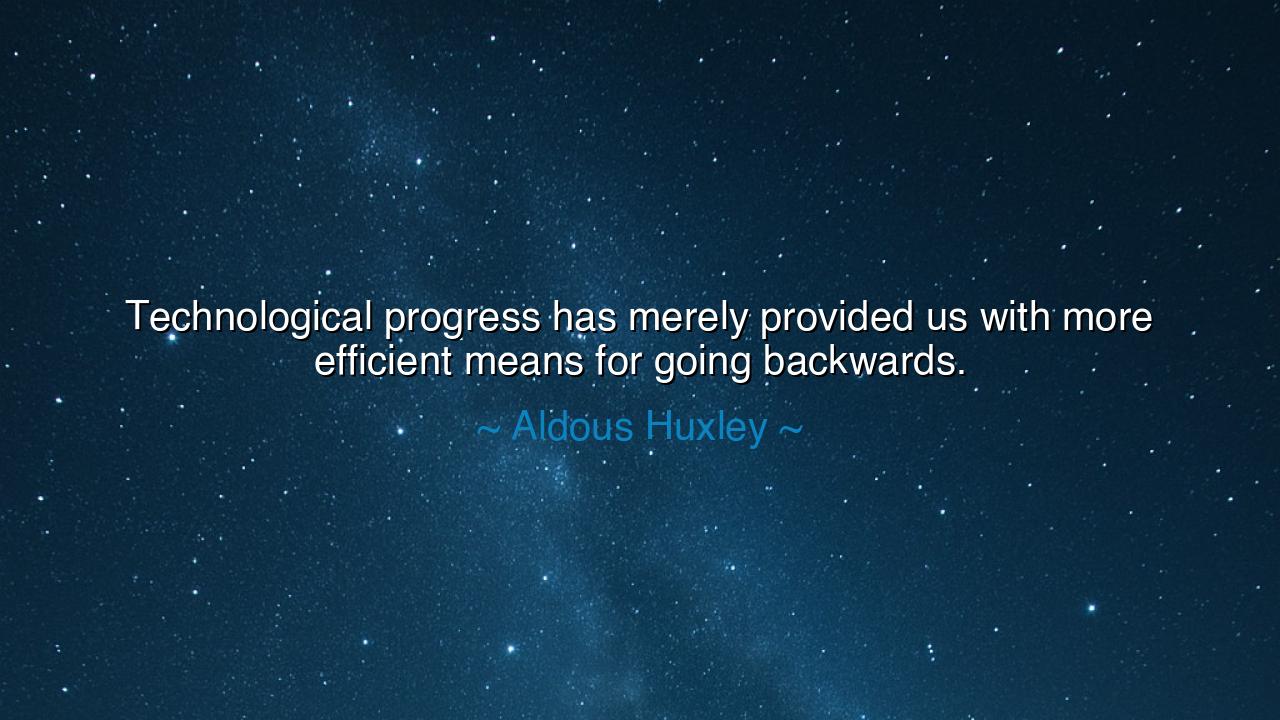
Technological progress has merely provided us with more
Technological progress has merely provided us with more efficient means for going backwards.






When Aldous Huxley, seer of futures both dazzling and grim, declared, “Technological progress has merely provided us with more efficient means for going backwards,” he spoke with the sorrowful clarity of a prophet. His words pierced the veil of triumph that so often surrounds progress, reminding humanity that not every forward step leads upward. A path may be paved with shining machines, yet still carry us into ruin if our hearts and minds remain unprepared.
In this saying lies a paradox: technology expands our power, but power without wisdom can undo rather than uplift. To fly through the skies is wondrous, but to use that flight for war is to turn progress into regression. To build mighty engines of industry is to multiply wealth, but if they choke the air and poison the rivers, we have merely hastened our decline. Huxley saw that unless guided by conscience, every increase in efficiency may simply accelerate our march in the wrong direction.
History itself bears witness to this truth. Consider the tragedy of the First World War, where modern technology—machine guns, tanks, and chemical gas—was unleashed upon mankind. In the name of progress, new weapons were forged, but their result was slaughter on a scale the ancients could scarcely imagine. Here, invention did not elevate civilization; it carried it backwards into greater barbarity, only masked by the cloak of steel. Huxley’s warning lives here: efficiency without purpose becomes destruction.
Another tale arises from the story of environmental decline. The machines of the Industrial Revolution were hailed as the engines of prosperity. They multiplied production, shortened labor, and filled the cities with goods. Yet alongside their gifts came smog-filled skies, blackened rivers, and laborers crushed in poverty. The “progress” of industry, when untempered by justice or foresight, brought humanity not forward but into a deeper bondage—one not of chains but of smoke and soot. It was progress that bent the arc of civilization backward.
Yet Huxley does not speak only of technology’s failures. His words carry a deeper teaching: that true progress must be measured not by speed or efficiency, but by direction and purpose. A ship that sails faster in the wrong direction only lengthens its journey. A society that invents greater tools without greater wisdom only magnifies its folly. The essence of civilization lies not in how much we can do, but in whether what we do serves life, truth, and the dignity of mankind.
O seekers of truth, take this lesson to heart: do not mistake the brilliance of invention for the nobility of progress. The gleam of new devices, the thrill of efficiency, the marvel of speed—all these are empty if they carry us away from justice, compassion, and harmony with the world. What Huxley reminds us is that the moral compass must guide the engine, or else the engine will drive us into darkness swifter than before.
Therefore, let your lives reflect this wisdom. When you adopt new tools, ask: do they enrich not only my convenience, but also my humanity? When you create, ask: does this invention uplift or degrade? Let every step of progress be paired with reflection, every leap of power be matched with conscience. In this way, you will ensure that efficiency does not carry you backwards, but forward into true civilization.
So remember Huxley’s warning: “Technological progress has merely provided us with more efficient means for going backwards.” Guard yourselves against the illusion of progress without purpose. Build not only with strength but with wisdom, and let your creations serve not vanity but virtue. Only then will your journey be forward, not merely faster into ruin.






AAdministratorAdministrator
Welcome, honored guests. Please leave a comment, we will respond soon